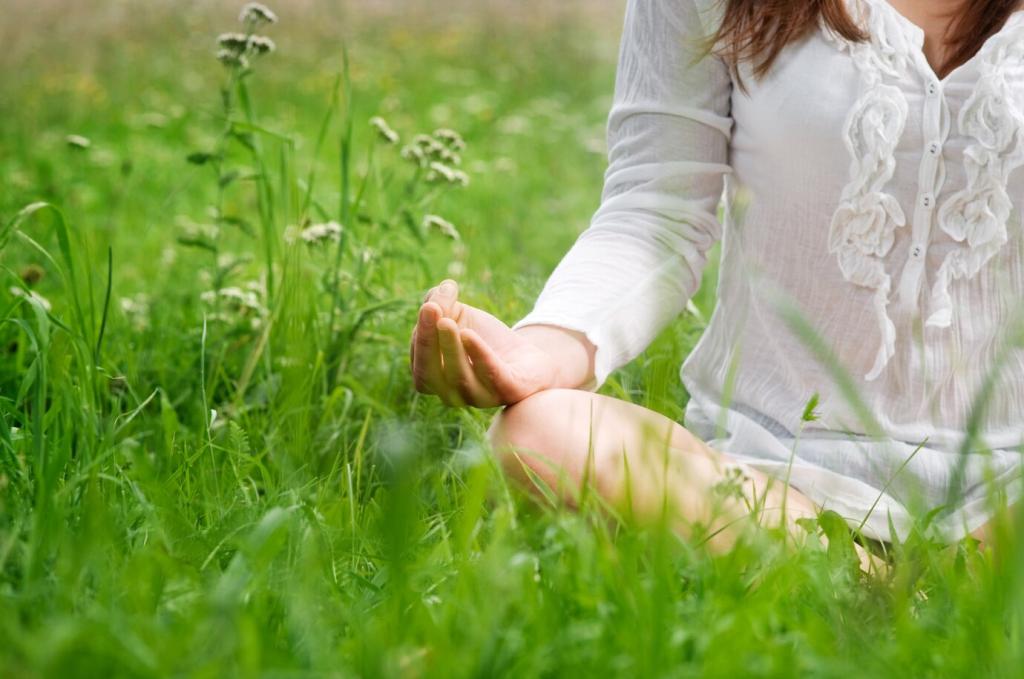
Benefits of Mindfulness Meditation for Mental Health
Today’s theme: Benefits of Mindfulness Meditation for Mental Health. Step into a gentler pace, where practical practices, real stories, and solid science show how small daily pauses can transform stress, mood, and resilience. Read on, try a practice, and tell us how it lands.
How Mindfulness Shapes the Brain
Regular mindfulness practice is linked to reduced amygdala reactivity, helping the brain pause before panic. By noticing sensations and thoughts as events, not emergencies, you create space between trigger and response. What would you do with that precious, calming second?

How Mindfulness Shapes the Brain
The prefrontal cortex supports planning, impulse control, and perspective. Mindfulness strengthens this executive hub, making it easier to stay with a task, soften rumination, and choose wiser actions. Share a moment when a single mindful breath helped you steer a tough conversation.
Relief from Stress and Anxiety You Can Feel
The Three-Breath Reset
Inhale and feel the belly rise, exhale longer than the inhale, repeat three times. This tiny practice nudges the nervous system toward calm. Use it before emails, meetings, or difficult calls. Try it now and share where you felt the first hint of ease.
Name It to Tame It
Gently labeling inner states—“tightness,” “worry,” “sadness”—activates language regions that balance emotion centers. Naming is not denying; it is recognizing. The moment we recognize, we can respond wisely. Comment with one feeling you labeled today and how it changed your next choice.
The Body Scan Signal
A slow head-to-toe body scan builds interoception, the felt sense of internal signals. Spotting tension early prevents spirals. Even a two-minute scan at your desk can soften shoulders and thoughts. Subscribe for a weekly guided scan you can save for busy days.
Evidence You Can Trust
Large reviews suggest mindfulness-based programs can reduce anxiety and depressive symptoms, with effects comparable to some standard treatments for mild to moderate concerns. Benefits grow with consistent practice. If you like data, tell us which outcomes you want unpacked next.
Mindfulness Weaved into Everyday Life
Before touching your phone, feel three breaths, name one intention, sip water slowly, and notice temperature and taste. Sixty seconds, meaningful tone. Try tomorrow and tell us your intention word. We’ll feature a community list to inspire others starting out.


Mindfulness Weaved into Everyday Life
Choose a route, feel the contact of each foot, relax your jaw, and match steps to steady breaths. When thoughts pull you, return to sensations kindly. Post your favorite mindful walk photo and the sound you noticed most on the path.


Resilience at Work and School
Try the 25-5 rhythm: twenty-five minutes of one task with five mindful breaths before the break. Notice the urge to switch tabs and meet it with curiosity. Share your most distracting moment this week and how you redirected without self-criticism.
Resilience at Work and School
Micro-pauses interrupt chronic stress accumulation. A minute between meetings to feel feet and breathe can reset your baseline. Teams that normalize mindful pauses report kinder feedback loops. Invite a colleague to join a two-minute reset and tell us what shifted in the room.
Sleep and Mood: Steadier Nights, Softer Days
An Evening Wind-Down Ritual
Dim lights early, put your phone away, and do a gentle five-minute body scan in bed. When thoughts race, notice them like clouds passing. If you try this for a week, comment with one difference you felt waking up.
Relapse Prevention and Gentle Noticing
Mindfulness-Based Cognitive Therapy teaches noticing early mood shifts without catastrophizing. Seeing the first flickers means you can apply supports sooner. Pair practices with routines you already keep. Subscribe for a printable early-warning checklist to personalize with your patterns.
When Night Worries Visit
Place a notepad by the bed. If worries loop, write a kind, single-sentence plan and return to breath. The act of naming and parking is soothing. Share your most helpful nighttime phrase; someone reading might need exactly that kindness.
Overcoming Common Obstacles
“I Can’t Stop Thinking” Isn’t Failure
Thoughts continue; success is noticing and returning without scolding yourself. Each return is a repetition that strengthens attention. Celebrate the return. Tell us about a moment you almost quit and what helped you sit for thirty more seconds.
No Time? Try Micro-Moments
Anchor to existing habits: one mindful breath at doorways, two during handwashing, three before replying to messages. Tiny practices add up surprisingly fast. Post your favorite micro-habit so new readers can borrow it and begin today, not someday.
Consistency Over Perfection
Aim for most days, not every day. Track with compassionate notes, not streak pressure. If you miss, simply begin again. Join our newsletter for weekly five-minute practices and share your progress; your honesty might be the nudge someone needs.
